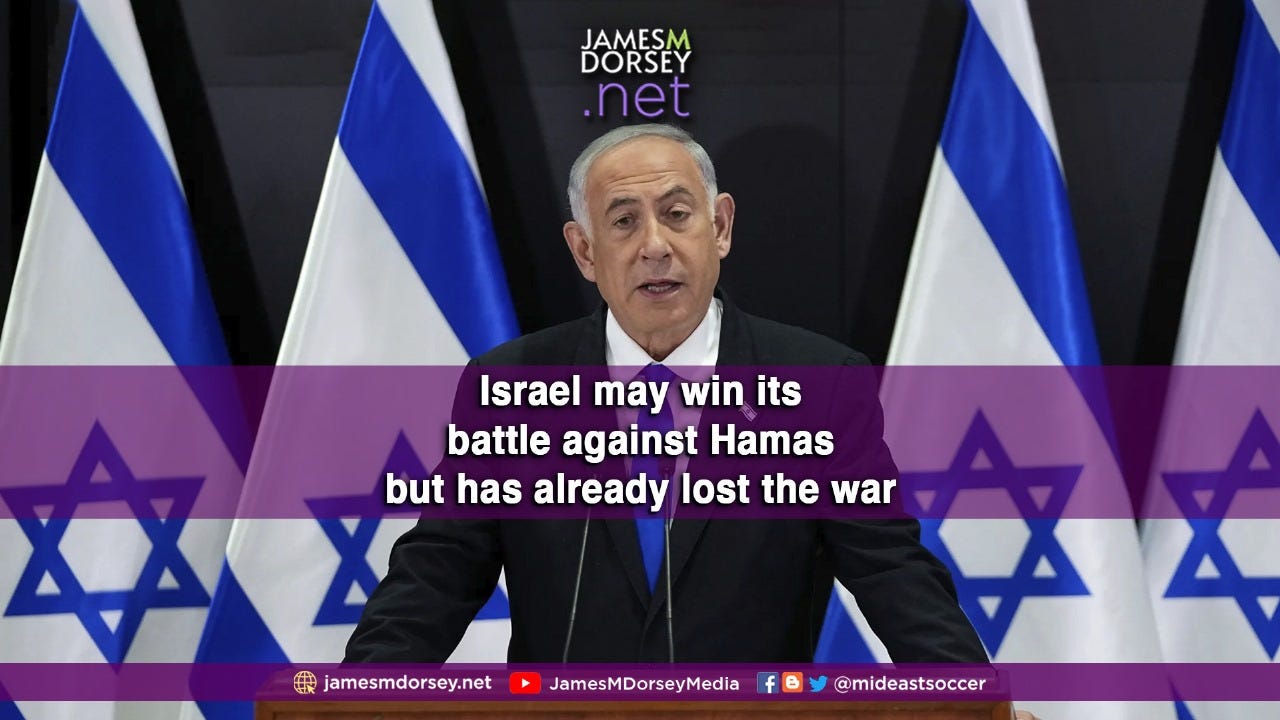
Israel May Win Gaza War, But It Has Already Lost The Battle For Public Opinion

Israel will likely win the Gaza war on the battlefield. Even so, it has already been defeated in the court of public opinion.
It no longer really matters who attacked Gaza’s Al Ahli Arab Hospital in which hundreds of innocent civilians were killed or the Greek Orthodox Saint Porphyrius Church in the Strip.
Public opinion has issued its verdict on the streets of cities across the Middle East and beyond.
It took the attack on the hospital, which Israel asserts involved a misfired Palestinian rocket launch, not Israeli warplanes, some 10 days into the Israeli assault on Gaza to bring protesters to the streets.
The time lag is telling and hints at the ultimate political fallout of a war that plays to the deepest fears and traumas of both Israelis and Palestinians as well as Arab autocrats’ security concerns.
Even if anti-Israeli sentiment runs deep in the Middle East because of its 56-year-long occupation of the West Bank, 17-year-long blockade of Gaza in cooperation with Egypt, and refusal to sincerely negotiate the creation of an independent Palestinian state, aided by the incompetence of the Palestine Authority, many were ambivalent about Hamas’ brutal October 7 attack on Israel.
No doubt, Palestinians and Arabs took pride in a Palestinian militia successfully attacking Israel and breaching its image of military and intelligence superiority and invincibility.
But at the same time, many in the Middle East were troubled by Hamas’ indiscriminate slaughter of innocent men, women, and children and kidnapping of some 200 people, mostly civilians.
Breaking taboos, Arab voices on social media took Hamas before the hospital attack to task for its unwarranted brutality, sparking a rare discussion in the Arab world.
The indiscriminate Israeli bombing, the stream of heart-wrenching images emerging from Gaza, and the genocidal language employed by Israeli leaders silenced those voices.
To be sure, Hamas’ language is no less genocidal as is its charter.
In some Arab quarters, distance to Hamas was driven by perceptions of its alleged affiliation with the Muslim Brotherhood, a polarizing group that like Palestine evokes deep-seated passions.
The Israeli assault on Gaza has put that on the backburner.
Worse from the perspective of Israel and Saudi Arabia, the Hamas success raises the spectre of other groups aligned with Iran, like Hezbollah, the Lebanese Shiite militia, and Houthi rebels in Yemen, emulating the Hamas model.
Hezbollah and the Houthis are far more battle-hardened and better equipped than Hamas.
Israel’s ferocious response to Hamas’ attack may prove less of a deterrent than many think.
Israel’s decades of wielding a sledgehammer and continued collective punishment has failed to quell Palestinian aspirations or stop Palestinians from resisting Israel.
As a result, Arab states, whether formally or informally engaged with Israel, are in a bind. They may want to see Hamas defeated on the battlefield, if not destroyed, but are restricted by pro-Palestinian public opinion.
Moreover, Hamas’ ability to breach Israeli security and trap Israel in the words of Middle East scholar and commentator Hussein Ibish, if it moves ahead with a ground offensive in Gaza, bolsters Iran as a significant security threat in the eyes of Gulf states.
The threat is compounded by comparisons between the 1973 Middle East war and the Gaza war.
To be sure, Egypt and Syria restored their pride in 1973 by, like Hamas, taking Israel by surprise and achieving initial battlefield successes.
Like Hamas, Egypt and Syria lost on the battlefield but won the war politically. Ultimately, the war led to President Anwar Sadat’s unprecedented 1977 visit to Jerusalem and the 1979 Egyptian-Israeli peace treaty.
But, unlike the Hamas attack and Israel’s response, the 1973 war, fought along conventional military lines, did not evoke the Israeli trauma of the Holocaust or the Palestinian ordeal of the 1948 and 1967 expulsions and displacements.
As a result, the Gaza war is likely to harden sentiments on both sides of the Israeli-Palestinian divide in ways that the 1973 war did not, making an equitable resolution of the conflict any time soon highly unlikely.
Some analysts have suggested that Ibish’s trap with Israel seemingly lacking an exit strategy and potentially being sucked into a long-term occupation of Gaza that would provoke criticism from its closest allies, including the United States, may open the possibility of the Strip being temporarily administered by the United Nations and/or a coalition of Arab states.
That may prove easier said than done. Condominiums tend to have a life of their own and involve the kind of commitment and involvement Arab states may not want to shoulder.
For starters, Israel, deeply suspicious of the United Nations, is likely to reject the idea.
Similarly, Israel, particularly given Arab public opinion, is unlikely to want to surrender or limit its notion of Gaza security with the involvement of Arab states.
By the same token, Arab states may be tempted by the return of Arab land to Arab control but will fear being sucked into the Israeli-Palestinian conflict in ways they have avoided for the past 75 years since Israel was established, except for during the Jordanian and Lebanese civil wars.
At the bottom line, Hamas’s brutal attack and Israel’s ferocious response, true to a paradigm of the Israeli-Palestinian conflict, have strengthened hardliners on both sides of the divide, even if neither Hamas nor Israeli Prime Minister Benyamin Netanyahu survive the war. (IPA Service)
By arrangement with the Arabian Post
The post Israel May Win Gaza War, But It Has Already Lost The Battle For Public Opinion first appeared on Latest India news, analysis and reports on IPA Newspack.



